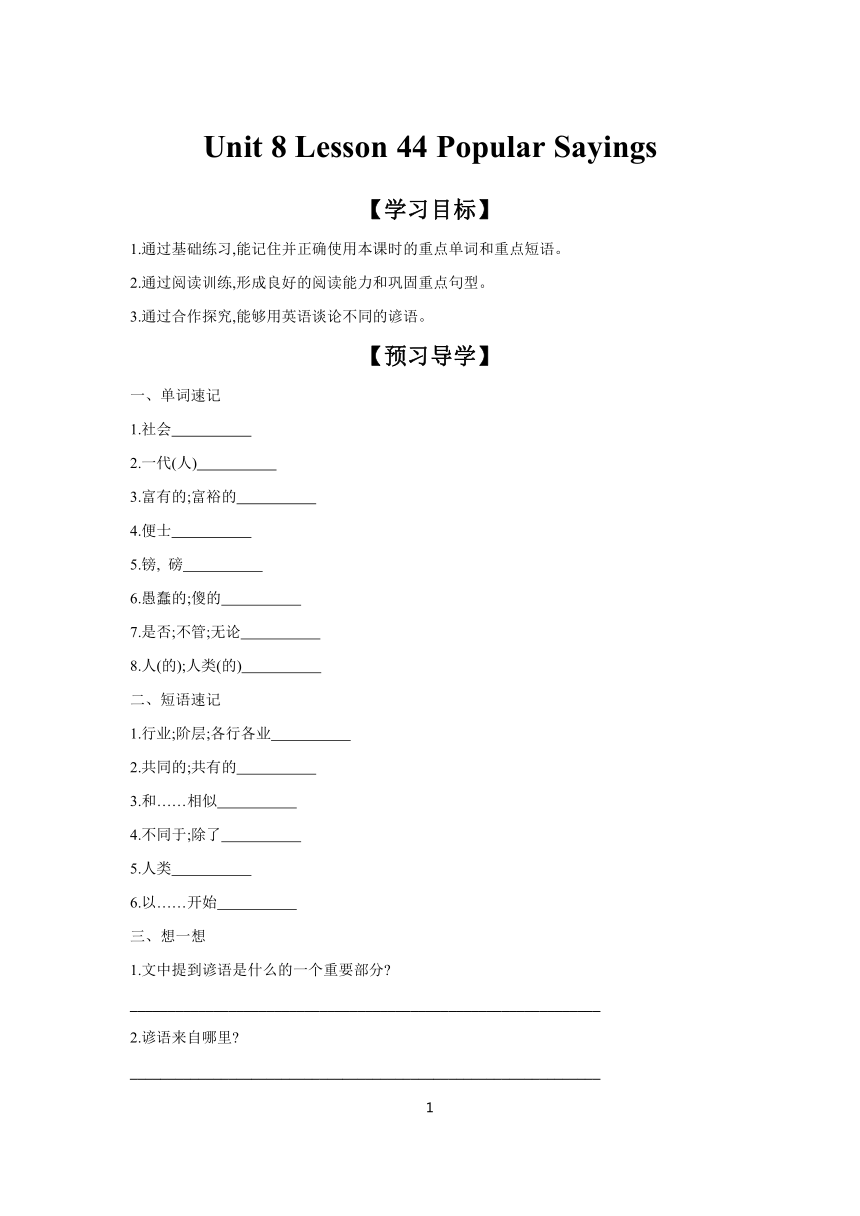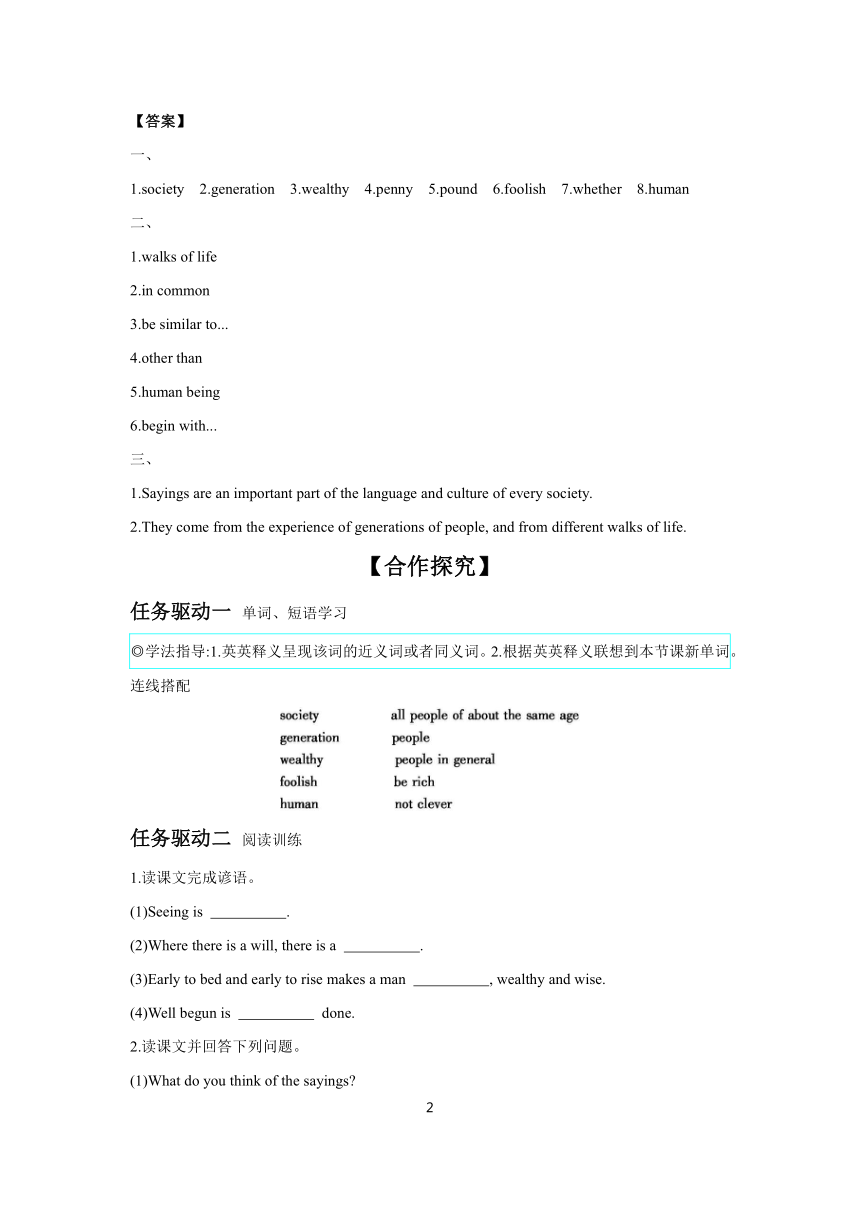Unit 8 Lesson 44 Popular Sayings 学案(含答案) 2023-2024学年初中英语冀教版九年级全一册
文档属性
| 名称 | Unit 8 Lesson 44 Popular Sayings 学案(含答案) 2023-2024学年初中英语冀教版九年级全一册 |

|
|
| 格式 | docx | ||
| 文件大小 | 62.1KB | ||
| 资源类型 | 教案 | ||
| 版本资源 | 冀教版 | ||
| 科目 | 英语 | ||
| 更新时间 | 2024-02-28 00:00:00 | ||
图片预览


文档简介
Unit 8 Lesson 44 Popular Sayings
【学习目标】
1.通过基础练习,能记住并正确使用本课时的重点单词和重点短语。
2.通过阅读训练,形成良好的阅读能力和巩固重点句型。
3.通过合作探究,能够用英语谈论不同的谚语。
【预习导学】
一、单词速记
1.社会
2.一代(人)
3.富有的;富裕的
4.便士
5.镑, 磅
6.愚蠢的;傻的
7.是否;不管;无论
8.人(的);人类(的)
二、短语速记
1.行业;阶层;各行各业
2.共同的;共有的
3.和……相似
4.不同于;除了
5.人类
6.以……开始
三、想一想
1.文中提到谚语是什么的一个重要部分
______________________________________________________________
2.谚语来自哪里
______________________________________________________________
【答案】
一、
1.society 2.generation 3.wealthy 4.penny 5.pound 6.foolish 7.whether 8.human
二、
1.walks of life
2.in common
3.be similar to...
4.other than
5.human being
6.begin with...
三、
1.Sayings are an important part of the language and culture of every society.
2.They come from the experience of generations of people, and from different walks of life.
【合作探究】
任务驱动一 单词、短语学习
◎学法指导:1.英英释义呈现该词的近义词或者同义词。2.根据英英释义联想到本节课新单词。
连线搭配
任务驱动二 阅读训练
1.读课文完成谚语。
(1)Seeing is .
(2)Where there is a will, there is a .
(3)Early to bed and early to rise makes a man , wealthy and wise.
(4)Well begun is done.
2.读课文并回答下列问题。
(1)What do you think of the sayings
______________________________________________________________
(2)Where do they come from
______________________________________________________________
(3)What's the English for the Chinese saying “ai wu ji wu”
______________________________________________________________
3.反复读课文。熟记课文,掌握文章各段的段落大意,并借此来复述课文,提高口语表达的能力。
任务驱动三 小组活动(五则谚语)
请分别为下面五则谚语找到相应的寓意。
( )1.It's never too late to learn.
( )2.A crane standing amidst a flock of chickens.
( )3.The early bird catches the worm.
( )4.Play a harp before a cow.
( )5.A book holds a house of gold.
A.This proverb means that you do something useless.
B.This proverb means that someone is the best of all.
C.This proverb means that if you study hard, you will succeed.
D.This proverb means that there're many things to learn no matter how old you are.
E.This proverb means that if you do something early before others, you will have more chances and be successful.
【答案】
任务驱动一
1.
任务驱动二
1.(1)believing (2)way (3)healthy (4)half
2.(1)They are usually simple and easy to remember, but they are full of deep meaning.
(2)They come from the experience of generations of people and from different walks of life.
(3)Love me, love my dog.
任务驱动三
1.D 2.B 3.E 4.A 5.C
【知识超市】
[命题点]Whether the sayings are in Chinese, English, or any other language, they share something in common. 不论这些谚语是汉语, 英语还是其他语言, 它们都有一些共同点。
whether conj.意为“是否; 不管; 无论”。whether的两种用法:
1.whether 意为“是否”时,主要用来引导宾语从句,从句可以用一般将来时。
2.whether意为“不管,无论”时,用来引导让步状语从句,常用一般现在时代替一般将来时。
辨析:whether与if都表示“是否”,引导宾语从句,一般可以互换,但仍有区别。
只用 whether 的情况 与or not连用时
引导宾语从句,且从句位于句首表示强调时
从句作介词的宾语时
在动词不定式之前时
在某些动词(如discuss)后
只用if 的情况 引导否定概念的宾语从句时
引导条件状语从句,意为“如果”时
如:
He asked if/whether we wanted a drink. 他问我们是否想喝一杯。
Please call me if you arrive at the airport.假如你到了机场,请打电话给我。
I worry about whether I hurt her.我担心我是否伤害到了她。
Whether you like it or not, you'll have to do it.不管你愿不愿意,你都得做这件事。
对点自测
单项选择。
( )1.Judy is an outgoing girl. She shows everything on her face she is happy or not.
A.whether B.until
C.unless D.although
( )2.—I'm not sure my suggestion is helpful to you.
—It certainly is. Every little bit helps.
A.why B.how
C.whether D.where
( )3.—How wonderful the school concert is! We talk about our school will hold it next year.
—Sure. It's our school tradition!
A.how B.whether
C.where D.if
【答案】
1.A 2.C 3.B
2
【学习目标】
1.通过基础练习,能记住并正确使用本课时的重点单词和重点短语。
2.通过阅读训练,形成良好的阅读能力和巩固重点句型。
3.通过合作探究,能够用英语谈论不同的谚语。
【预习导学】
一、单词速记
1.社会
2.一代(人)
3.富有的;富裕的
4.便士
5.镑, 磅
6.愚蠢的;傻的
7.是否;不管;无论
8.人(的);人类(的)
二、短语速记
1.行业;阶层;各行各业
2.共同的;共有的
3.和……相似
4.不同于;除了
5.人类
6.以……开始
三、想一想
1.文中提到谚语是什么的一个重要部分
______________________________________________________________
2.谚语来自哪里
______________________________________________________________
【答案】
一、
1.society 2.generation 3.wealthy 4.penny 5.pound 6.foolish 7.whether 8.human
二、
1.walks of life
2.in common
3.be similar to...
4.other than
5.human being
6.begin with...
三、
1.Sayings are an important part of the language and culture of every society.
2.They come from the experience of generations of people, and from different walks of life.
【合作探究】
任务驱动一 单词、短语学习
◎学法指导:1.英英释义呈现该词的近义词或者同义词。2.根据英英释义联想到本节课新单词。
连线搭配
任务驱动二 阅读训练
1.读课文完成谚语。
(1)Seeing is .
(2)Where there is a will, there is a .
(3)Early to bed and early to rise makes a man , wealthy and wise.
(4)Well begun is done.
2.读课文并回答下列问题。
(1)What do you think of the sayings
______________________________________________________________
(2)Where do they come from
______________________________________________________________
(3)What's the English for the Chinese saying “ai wu ji wu”
______________________________________________________________
3.反复读课文。熟记课文,掌握文章各段的段落大意,并借此来复述课文,提高口语表达的能力。
任务驱动三 小组活动(五则谚语)
请分别为下面五则谚语找到相应的寓意。
( )1.It's never too late to learn.
( )2.A crane standing amidst a flock of chickens.
( )3.The early bird catches the worm.
( )4.Play a harp before a cow.
( )5.A book holds a house of gold.
A.This proverb means that you do something useless.
B.This proverb means that someone is the best of all.
C.This proverb means that if you study hard, you will succeed.
D.This proverb means that there're many things to learn no matter how old you are.
E.This proverb means that if you do something early before others, you will have more chances and be successful.
【答案】
任务驱动一
1.
任务驱动二
1.(1)believing (2)way (3)healthy (4)half
2.(1)They are usually simple and easy to remember, but they are full of deep meaning.
(2)They come from the experience of generations of people and from different walks of life.
(3)Love me, love my dog.
任务驱动三
1.D 2.B 3.E 4.A 5.C
【知识超市】
[命题点]Whether the sayings are in Chinese, English, or any other language, they share something in common. 不论这些谚语是汉语, 英语还是其他语言, 它们都有一些共同点。
whether conj.意为“是否; 不管; 无论”。whether的两种用法:
1.whether 意为“是否”时,主要用来引导宾语从句,从句可以用一般将来时。
2.whether意为“不管,无论”时,用来引导让步状语从句,常用一般现在时代替一般将来时。
辨析:whether与if都表示“是否”,引导宾语从句,一般可以互换,但仍有区别。
只用 whether 的情况 与or not连用时
引导宾语从句,且从句位于句首表示强调时
从句作介词的宾语时
在动词不定式之前时
在某些动词(如discuss)后
只用if 的情况 引导否定概念的宾语从句时
引导条件状语从句,意为“如果”时
如:
He asked if/whether we wanted a drink. 他问我们是否想喝一杯。
Please call me if you arrive at the airport.假如你到了机场,请打电话给我。
I worry about whether I hurt her.我担心我是否伤害到了她。
Whether you like it or not, you'll have to do it.不管你愿不愿意,你都得做这件事。
对点自测
单项选择。
( )1.Judy is an outgoing girl. She shows everything on her face she is happy or not.
A.whether B.until
C.unless D.although
( )2.—I'm not sure my suggestion is helpful to you.
—It certainly is. Every little bit helps.
A.why B.how
C.whether D.where
( )3.—How wonderful the school concert is! We talk about our school will hold it next year.
—Sure. It's our school tradition!
A.how B.whether
C.where D.if
【答案】
1.A 2.C 3.B
2
同课章节目录
- Unit 7 Work for Peace
- Lesson 37 Don't Fight!
- Lesson 38 Making School a Better Place
- Lesson 39 The Dove and the Olive Branch
- Lesson 40 The UN—Power of Words
- Lesson 41 Jenny's Good Advice
- Lesson 42 Peace at Last
- Unit Review
- Unit 8 Culture Shapes Us
- Lesson 43 A Visit to Chinatown
- Lesson 44 Popular Sayings
- Lesson 45 Different Manners
- Lesson 46 Home to Many Cultures
- Lesson 47 Good Manners
- Lesson 48 Supper with the Bradshaws
- Unit Review
- Unit 9 Communication
- Lesson 49 Get Along with Others
- Lesson 50 Tips for Good Communication
- Lesson 51 What Could Be Wrong?
- Lesson 52 The Power of a Smile
- Lesson 53 Working in Groups
- Lesson 54 How Embarrassing!
- Unit Review
- Unit 10 Get Ready for the Future
- Lesson 55 Look into the Future
- Lesson 56 Manage Your Time
- Lesson 57 Best Wishes
- Lesson 58 Ms.Liu's Speech
- Lesson 59 Keep Your Choices Open
- Lesson 60 Get a Good Education
- Unit Review
